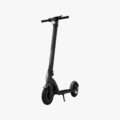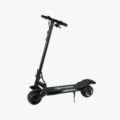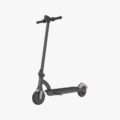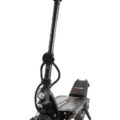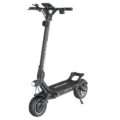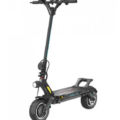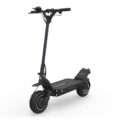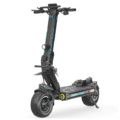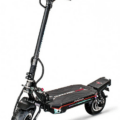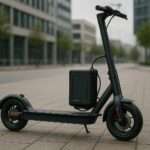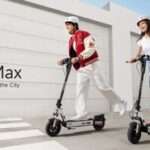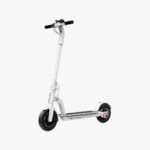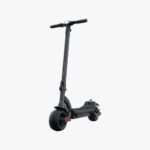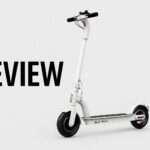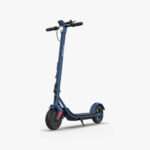- Home
- Scooters
- Electric Scooters
- Jetson Eris Pro
Jetson Eris Pro
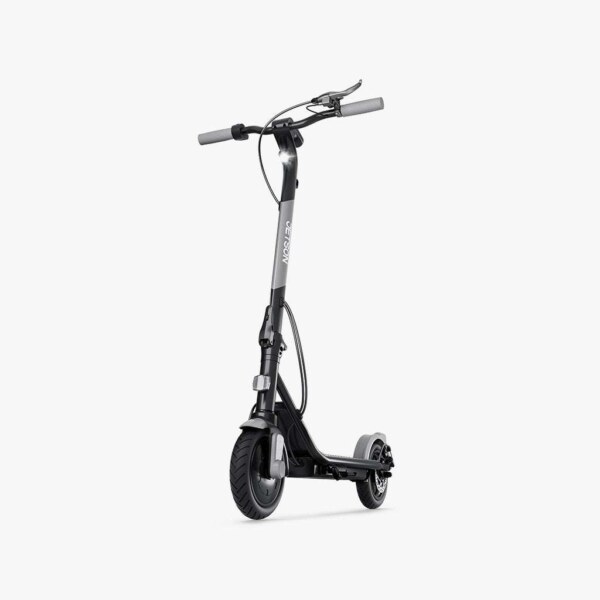

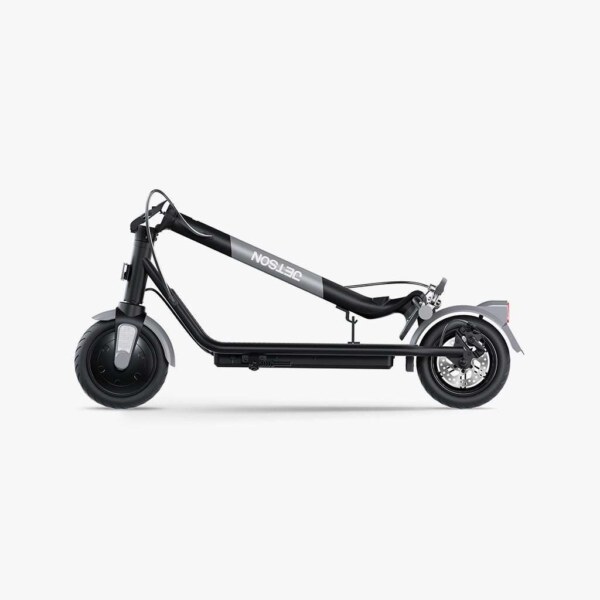
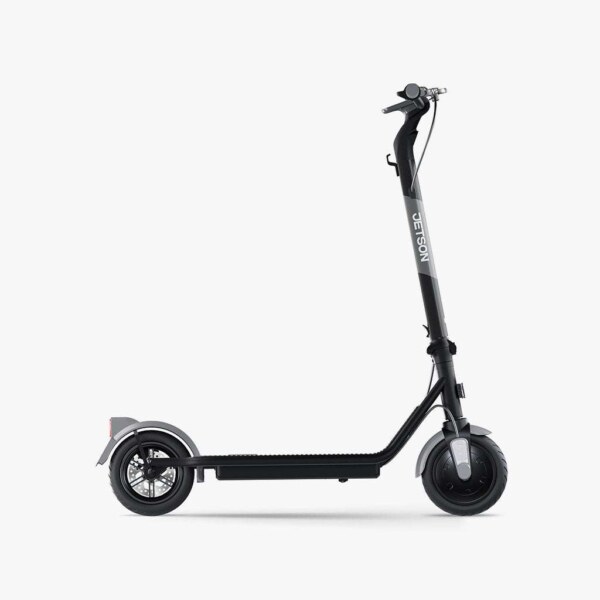
- Battery Range: 12 miles (19 km)
- Top Speed: 16 mph (25.7 km/h)
- Motor Power: 350 W
- Weight Capacity: 265 lb (120 kg)
- Charging Time: Approx. 6 hours
- Scooter Weight: 35 lb (15.9 kg)
PROS
- 350 W motor
- offers stronger accelerationrn16 mph (25.7 km/h) top speed for faster commutes
- 265 lb (120 kg) max rider weight capacity
- 8.5 in pneumatic tires improve comfort and grip
- 3 ride modes and cruise control for flexible pacing
CONS
- 12 miles (19 km) range is limited for longer trips
- 35 lb (15.9 kg) weight less convenient to carry
- No built-in app connectivity or locking
- No suspension beyond air-filled tires
Key Takeaways
- The Jetson Eris Pro is a foldable electric scooter designed for commuting, offering stability and easy storage.
- It features a 350W motor with a top speed of 16 mph and a battery range of up to 12 miles, depending on rider weight and terrain.
- With a weight of 35 lbs, it is portable and suitable for mixed commutes, fitting easily in small spaces.
- The scooter includes safety features like a rear mechanical disc brake, headlights, and a simple LED display for information.
- Best suited for short urban rides, it is not ideal for steep hills or off-road use, making it perfect for city dwellers.
Table of contents
- What Is the Jetson Eris Pro?
- How the Jetson Eris Pro Works
- Key Specifications
- Design & Build Quality
- Performance Fundamentals
- Battery, Range & Efficiency
- Ride Quality & Comfort
- Braking & Safety Features
- Portability & Daily Usability
- Maintenance & Care
- Weather & Seasonal Considerations
- Jetson Eris Pro vs Alternatives
- Who the Jetson Eris Pro Is (and Isn’t) For
The Jetson Eris Pro is a compact electric scooter built for everyday rides. It suits riders who want simple controls, steady handling, and easy storage, not chase for top speed. So it fits students, commuters, and last mile riders who need something light, foldable, and predictable for real city use.
What Is the Jetson Eris Pro?
The Jetson Eris Pro is a foldable adult scooter with a 350W front hub motor and a rated top speed of 16 mph (25.7 km/h). It runs on a 36V, 7.5Ah lithium-ion battery and rolls on 8.5 in (21.6 cm) pneumatic tires, so it feels closer to a real commuter tool than a toy. The rated weight range from 100 lb (45.4 kg) up to 265 lb (120.2 kg) covers most teens and adults without drama.
The layout feels familiar from the first minute. You stand on a rubberized deck, grab a straight handlebar with a thumb throttle on one side and a hand brake on the other, then glance at a centered LED display for speed and battery. A headlight, rear light, bell, and side kickstand cover the basics. So there is nothing strange to figure out.
The Jetson Eris Pro sits between tiny kids’ scooters and heavy performance tanks. It aims for stable city speeds, clean folding, and low maintenance hardware instead of big claims that rarely match daily use.
How the Jetson Eris Pro Works
Think of the Eris Pro as a slim, quiet frame with a motor in the front wheel. Then keep only the pieces that help you ride.
The 350W front hub motor drives the wheel when you press the thumb throttle. Power comes in smooth, so starts feel controlled, not jumpy. Three speed modes limit how fast you go. One gentle mode for tight paths and shared areas. One middle mode for relaxed street riding. One full mode that lets you reach the claimed 16 mph on open stretches.
The 36V battery sits inside the deck and connects to a 42V charger through a covered port. The controller manages how much power reaches the motor, so the scooter reacts in a steady, repeatable way from full charge down to low battery.
A rear mechanical disc brake handles stopping. Pull the lever, the caliper clamps the rotor, and the scooter slows with clear feedback. Motor drive cuts during braking, so it does not push against you.
The LED display shows speed, battery level, and mode. One button cycles through modes. Cruise control kicks in after you hold a steady throttle for a few seconds. Then it keeps that pace until you tap the brake or move the throttle, which makes long flat runs less tiring on your hand.
Key Specifications
This section gathers the core specifications in one place.
| Block | Details |
|---|---|
| General | Model: Jetson Eris Pro (SKU JERSP-BLG). Type: Foldable adult electric scooter. Recommended age: 12+. Rider weight: 100–265 lb (45.4–120.2 kg). |
| Performance & Power | Motor: 350W front hub. Top speed: 16 mph (25.7 km/h). Three speed modes. Stated max climbing angle: 10°. |
| Battery, Charging & Electrical | Battery: 36V, 7.5Ah lithium-ion (about 270Wh). Charger: 42V, 1.5A. Claimed charge time: about 6 hours. LED display for speed, mode, and battery. Front headlight and rear brake light. |
| Build & Dimensions | Weight: 35 lb (15.9 kg). Unfolded: 42.1 x 23.4 x 45.7 in (106.9 x 59.4 x 116.1 cm). Folded: 42.1 x 23.4 x 20.0 in (106.9 x 59.4 x 50.8 cm). Deck: 19.0 x 6.7 in (48.3 x 17.0 cm). Tires: 8.5 in (21.6 cm) pneumatic. |
| Safety & Control | Rear mechanical disc brake. Rear light. Grippy rubber deck. Bell. Recommended protective gear. |
| Features & Extras | Cruise control, three riding modes, LED display, side kickstand, folding stem latch for carrying and storage. No Bluetooth app. |
| Warranty & Compliance | Limited manufacturer warranty. UL 2272 compliant. Proposition 65 warning on some units. |
These specifications match what riders can expect in normal daily use.
Design & Build Quality
The Jetson Eris Pro follows a clean, straightforward design. The stem angle and bar height hit a comfortable middle ground for many riders, so you stand relaxed instead of hunched. The bar has enough width to feel stable, yet it still slips through doors and crowded spots without fuss.
The deck has a full length rubberized top. Grip feels secure in dry conditions, and the width supports the classic one foot forward stance with room to adjust. At about 19 in (48.3 cm) long, it holds most shoe sizes without feeling cramped. So you can nudge your back foot until the stance feels right.
The folding hinge sits above the deck with a latch that clicks in place. When locked correctly, the front end feels solid for this class. A quick tug on the stem before each ride helps catch any play early, then a small adjustment usually fixes it.
Cables run close to the frame. The display sits central and low enough to read without sticking out. Grips, lever, and throttle sit where your hands expect them. So the cockpit feels natural and honest, even if the finish focuses more on function than flash.
Performance Fundamentals
On the road, the Jetson Eris Pro feels calm and predictable.
In the highest mode, it pulls away from a stop with enough pace for city riding without a harsh snap. It reaches around 10–12 mph in a short steady pull, then climbs toward its 16 mph cap. So new riders stay in control, and regular riders move at a pace that fits bike lanes and slower traffic.
Straight line stability is solid on flat pavement. The wide bar and centered deck let you steer with light inputs. Then a soft bend in the knees keeps things planted at top speed. If the hinge and bolts stay tight, wobble stays minor.
On grades around 7–10 percent, the Eris Pro can climb, yet it slows. Lighter riders keep better speed, and heavier riders feel it work harder on long hills. So it fits best in areas with mild climbs, bridges, and rolling streets, not long steep routes.
The power and speed match the numbers. It does not pretend to be more than it is.
Battery, Range & Efficiency
The battery pack runs at 36V and 7.5Ah, so roughly 270Wh. The claimed range sits up to 12 miles (19.3 km) in friendly conditions. Think lighter rider, smooth roads, steady speed, and mild weather.
Actual range changes fast with weight, speed, and terrain. A rider near 200 lb (91 kg) who rides full speed, hits hills, and stops often will see fewer miles. A lighter rider in the middle mode on mostly flat paths gets closer to the claim. So treat the range figure as a best case target, not a fixed rule.
You can stretch range with some simple habits:
- Use lower or middle modes in crowded areas.
- Roll into the throttle instead of snapping it wide open.
- Cruise around 10–12 mph when you have time.
- Avoid running the battery flat on every ride.
The 42V, 1.5A charger takes about 6 hours from low to full. So overnight or workday charging works well. Keep the charge port cap closed on rides, and stick to the proper charger to keep the pack healthy.
Ride Quality & Comfort
Ride comfort on the Jetson Eris Pro leans on its tires, geometry, and simple cockpit.
The 8.5 in pneumatic tires do a lot of the smoothing. At the right pressure, they soak up cracks, joints, and small potholes better than small solid wheels. So your hands and knees feel less buzz on normal streets and bike paths. If pressure drops too much, the ride turns dull and rim risk grows, so quick checks help.
The stance feels natural. The bar width gives control without strain. The deck length lets you shift your rear foot and find balance. The rubber deck pattern holds your shoes in place, which helps during braking and quick moves around rough spots.
There is no front or rear suspension unit. Big holes, broken concrete, and cobbles still feel sharp. So you slow down where surfaces look bad, bend your knees, and pick cleaner lines. For the intended use on paved routes, the mix of wheel size and frame weight gives a stable, comfortable feel.
Stem flex stays low when the latch and bolts stay snug. If you notice movement, a small tweak at home or quick shop visit sorts it.
Braking & Safety Features
Braking runs through the rear mechanical disc system. Pull the lever and power ramps in a clear, linear way. Light pressure for gentle slowdowns, stronger pull for quick stops. So once the cable tension is dialed, it feels predictable.
To keep braking sharp:
- Test lever feel before rides.
- Adjust the cable when the lever pulls too close to the grip.
- Keep the rotor clean and free from oil.
The rear light brightens under braking, so people behind you see changes sooner. The front headlight adds low light visibility and some short range beam. Add bright gear or reflectors on clothing or helmet for extra presence.
The grippy deck, the wide bar, and the steady steering layout support controlled riding. With a proper helmet and solid shoes, the safety package covers daily use well.
Portability & Daily Usability
Portability is one of the main reasons to pick the Jetson Eris Pro.
At about 35 lb (15.9 kg), it is not tiny, yet many adults can carry it up a few stairs, into elevators, or onto trains without much trouble. So it works for apartment buildings and office spaces when you plan your route a bit.
The folding system drops the stem toward the deck and locks it into a compact shape. The folded height around 20 in (50.8 cm) lets it slide under some desks or lean against a wall without blocking half the room. Then the latch keeps it together, so you can lift it as one piece over short distances.
For smoother daily use:
- Fold before stepping onto buses, trams, and trains.
- Store indoors when possible to protect electronics and finish.
- Use a solid lock through frame or stem for quick stops outside.
- Keep it close in crowded places to cut the risk of someone messing with it.
So the Eris Pro fits mixed commutes, tight halls, and shared spaces without making life difficult.
Maintenance & Care
Simple routine care keeps the scooter running well and feeling tight.
Before each ride:
- Check that the folding latch is fully closed and feels firm.
- Squeeze the brake lever to confirm quick, solid bite.
- Power on and confirm display and lights work.
- Look at both tires for cuts, debris, or low pressure.
Weekly for regular riders:
- Check tire pressure and bring it back to the recommended range.
- Inspect the brake cable and rotor, then tune if stopping power fades.
- Wiggle stem and bar to catch any looseness early.
Monthly:
- Check visible bolts on stem, clamp, bar, and deck. Tighten with care if needed.
- Wipe frame and deck with a damp cloth to clear dirt.
- Check the charge port cap and cable runs for wear or cracks.
Every few months:
- Revisit the manual for safety and service notes.
- Inspect hinge and latch parts for wear.
- Check tire tread depth and replace worn rubber.
Skip deep work on the battery or controller at home. One wrong move there can cause real trouble, so let qualified service handle those repairs.
Weather & Seasonal Considerations
The Jetson Eris Pro feels best in dry, mild weather. Even so, it can handle seasons if you ride with care.
On wet roads, grip drops. Painted lines, metal covers, and smooth tiles get slick fast. So slow down, brake earlier, and keep the scooter more upright in turns. Avoid standing water that hides holes or sends splash toward the electronics.
Cold air cuts range. When temperatures sit near or under 50°F (10°C), expect fewer miles from each charge. So bring the scooter indoors after cold rides and let it reach room temperature before charging.
Strong heat stresses the battery and plastics. A closed car or direct sun for long hours is a bad idea. So store it in shade or indoors on hot days.
After wet or dirty rides:
- Dry the deck, stem, and bolts.
- Check brake response.
- Look at the hinge and moving parts for grit.
With those small habits, the Eris Pro handles most normal climates without ugly surprises.
Jetson Eris Pro vs Alternatives
In its class, the Jetson Eris Pro lands in a balanced spot.
Tiny entry scooters weigh less and fold smaller, so they look tempting for very short trips. Yet many of them use hard wheels, lower weight limits, and feel shaky under adults. Big performance scooters bring more speed and range, then jump in weight and size, which makes stairs, desks, and narrow halls a pain.
The Eris Pro tries to sit in the middle. It supports riders up to 265 lb, uses 8.5 in pneumatic tires, reaches 16 mph, and stays around 35 lb. So it offers real comfort and support without turning into a large machine.
Riders who compare models might already read deeper product and certification coverage like the breakdown of Xiaomi’s recent approvals in this Xiaomi 6 Max and 6 Ultra UAE certification article, and that same mindset of checking real numbers and standards applies here.
Against other commuter scooters, the Eris Pro leans on clear controls, cruise control, a simple display, and straightforward parts. It skips complex apps and deep tuning menus. So riders who want to press the button, ride, fold, and park tend to find it easier to live with.
Who the Jetson Eris Pro Is (and Isn’t) For
The Jetson Eris Pro is a strong pick for:
- City and suburban commutes around 3–7 miles (5–11 km) each way on paved routes.
- Students who want a scooter that folds fast and fits in dorms or small rooms.
- Riders who want air tires, a real brake, cruise control, and clear readouts without extra setup.
- People who mix scooter trips with trains, buses, carpools, or short car hops.
It is not the best fit for:
- Riders who need 20+ mile (32+ km) daily range on one charge.
- Steep hill areas with long 10% climbs built into every route.
- Off-road or gravel paths, since it lacks suspension and knobby tires.
- Speed hunters who want hard launches or 25+ mph top speeds.
For those who outgrow its limits and want a burlier frame and extra punch, models like the Hiboy VE1 Pro move closer to a moped style feel, yet they bring more weight and size along with that step up.
So if your routes stay mostly flat or gently rolling, your storage space is tight, and you want something easygoing that just works, the Jetson Eris Pro lines up well with that routine.
Specifications
General
| Model The Model specifies the exact version or name of the scooter. It helps identify its unique design, features, and specifications within the manufacturer’s product line. Knowing the model makes it easier to compare options, find compatible accessories, or look up support information. | Eris Pro |
| Brand The Brand identifies the manufacturer or company that designs and produces the scooter. A trusted brand is a sign of quality, reliability, and good customer support. Well-known brands often have higher standards for safety, performance, and after-sales service, giving you more confidence in your purchase. | Jetson |
| Release Date The Release Date indicates when the scooter model was officially launched on the market. This helps you know how current the design, technology, and features are. A newer release date often means updated components, improved performance, and the latest safety or smart features. | 18 November 2025 |
| Recommended Age Recommended Age indicates the minimum age range that the scooter is designed for, based on safety, size, and ease of use. Following the recommended age helps ensure that riders can handle the scooter’s speed, weight, and controls comfortably and safely. Always check local laws and use protective gear, especially for younger riders. | 12+ |
Performance & Power
| Motor Power (Wattage) What it means: The motor power, measured in watts (W), shows how strong the scooter’s electric motor is. Why it matters: Higher wattage usually means better acceleration, more torque, and improved performance on hills or rough terrain. For example, a 250W motor is good for flat city roads and light riders, while a 500W or 1000W motor provides more power for faster speeds or climbing steep inclines. | 350 W hub motor |
| Top Speed The Top Speed indicates the maximum speed that the scooter can reach under optimal conditions. It’s usually measured on level ground with a fully charged battery and an average rider weight. A higher top speed allows you to travel longer distances faster, but always ensure you ride within legal speed limits and your personal comfort zone for safety. | 16 mph (25.7 km/h) |
| Battery Capacity Battery Capacity refers to the total amount of energy the scooter’s battery can store, usually measured in ampere-hours (Ah) or watt-hours (Wh). A higher battery capacity means you can ride longer distances on a single charge, reducing the need for frequent recharging. Keep in mind that actual range can vary depending on rider weight, terrain, speed, and weather conditions. | 36 V 7.5 Ah (270 Wh) |
| Estimated Range per Charge The Estimated Range per Charge indicates the average distance the scooter can travel on a single full battery charge. This range is calculated under optimal conditions, such as flat terrain, moderate speed, and average rider weight. Real-world range may vary depending on riding style, terrain, weather, and load. A longer range means fewer recharges and greater freedom for longer trips. | 12 miles (19 km) |
| Hill Climb Ability Hill Climb Ability describes the maximum incline or slope that the scooter can handle while maintaining stable performance. It’s typically expressed as a percentage or in degrees. A higher hill climb rating means the scooter can tackle steeper hills without losing too much speed or power. Actual climbing performance may vary based on rider weight, battery charge, and terrain conditions. | Not specified |
| Drive System The Drive System refers to how power from the motor is delivered to the wheels. Electric scooters typically use either a hub motor (directly integrated into the wheel) or a chain/belt drive system. A high-quality drive system ensures smooth acceleration, efficient power transfer, and low maintenance. The choice of drive system affects performance, noise level, and overall ride experience. | Rear hub (RWD) |
Charging & Electrical
| Charging Time Charging Time indicates how long it takes to fully recharge the scooter’s battery from empty to 100% using the standard charger provided. Faster charging means less downtime and more time on the road. Actual charging time may vary slightly depending on battery capacity, charger output, and environmental conditions. | Approx. 6 hours |
| Battery Type Battery Type refers to the specific technology used in the scooter’s battery, which affects performance, lifespan, weight, and charging time. Most modern electric scooters use high-quality lithium-ion (Li-ion) batteries because they offer a good balance of energy density, durability, and low maintenance. A reliable battery type ensures consistent power delivery and longer riding ranges. | 36 V 7.5 Ah lithium-ion battery |
| Removable Battery A Removable Battery means the battery pack can be easily detached from the scooter for convenient charging and replacement. This feature allows you to charge the battery separately, swap it with a spare for extended range, or securely store it indoors in extreme weather. Removable batteries add flexibility and make it easier to keep your scooter powered up wherever you are. | Non-removable internal battery |
| Regenerative Braking Regenerative Braking is an energy-saving feature that converts some of the energy normally lost during braking back into battery power. When you slow down or brake, the motor works in reverse to generate electricity, which helps extend the scooter’s range and improves overall efficiency. This system also reduces wear on traditional brake components, leading to lower maintenance over time. | Not specified |
| Lighting Lighting refers to the built-in front and rear lights that enhance visibility and safety when riding in low-light conditions or at night. Good lighting helps you see the road ahead and ensures that other road users can see you. Many scooters include LED headlights, taillights, and sometimes brake lights or side reflectors for added safety and compliance with local traffic regulations. | LED headlight and rear brake light |
Build & Dimensions
| Scooter Weight Scooter Weight refers to the total weight of the scooter when fully assembled, including the battery. This affects how easy it is to carry, lift, and store the scooter when not in use. A lighter scooter is more portable and convenient for commuting, especially if you need to carry it upstairs or onto public transport. Keep in mind that a sturdy frame and quality components may add to the weight but also contribute to better durability and ride stability. | 35 lb (15.9 kg) |
| Maximum Rider Weight Maximum Rider Weight indicates the highest rider weight that the scooter is designed to safely support while maintaining optimal performance and stability. Staying within this limit helps ensure reliable acceleration, braking, and climbing ability, and it protects the frame, suspension, and motor from excessive strain. Exceeding the recommended limit may reduce performance and increase wear on components. | 265 lb (120 kg) |
| Deck Size Deck Size refers to the dimensions of the scooter’s standing platform. A wider and longer deck provides more foot space, allowing you to stand comfortably and adjust your stance while riding. A well-sized deck improves balance and stability, especially on longer rides or at higher speeds. Compact decks, on the other hand, help keep the scooter lightweight and portable. | Reinforced commuter frame with wide deck |
| Handlebar Height Handlebar Height refers to the distance from the deck to the handlebars, which affects your riding posture and comfort. An appropriate handlebar height helps you maintain good balance, reduces strain on your back and arms, and makes steering more comfortable. Some scooters have adjustable handlebars to fit riders of different heights, while others have a fixed height for a streamlined design. | Fixed height 45.7 in (116.1 cm) |
| Folding Mechanism The Folding Mechanism describes how easily and securely the scooter can be folded for carrying and storage. A well-designed folding system lets you quickly collapse the scooter into a compact size, making it convenient to transport on public transit, store under a desk, or fit into a car trunk. Look for sturdy latches and safety locks to ensure the scooter stays firmly in place when folded or unfolded. | Foldable stem with latch for carrying and storage |
| Dimensions Folded Dimensions indicate the size of the scooter when it’s fully folded. This measurement shows how much space the scooter will take up when stored or carried, making it easier to check if it will fit in your car trunk, under a desk, or in a closet. Compact folded dimensions are ideal for commuters who need to bring their scooter on public transport or store it in tight spaces. | Unfolded: 42.1 x 23.4 x 45.7 in (106.9 x 59.4 x 116.1 cm); Folded: 42.1 x 23.4 x 20.0 in (106.9 x 59.4 x 50.8 cm) |
| Material Material refers to the primary construction materials used for the scooter’s frame and key components. High-quality materials like aircraft-grade aluminum, reinforced steel, or durable composites provide strength, stability, and a lighter overall weight. A sturdy material ensures the scooter can handle daily wear and tear while maintaining safety and performance. | Aluminum alloy |
Safety & Control
| Brake Type(s) Brake Type(s) describe the braking systems the scooter uses to help you slow down or stop safely. Common brake types include mechanical brakes (like drum or disc brakes), electronic brakes, and foot brakes. Many scooters combine multiple braking systems for added safety and shorter stopping distances. The type and quality of brakes affect your control, especially when riding at higher speeds or on slopes. | Rear disc brake |
| Suspension Suspension refers to the system that absorbs shocks and vibrations while riding, providing a smoother and more comfortable ride over uneven or rough surfaces. Scooters may have front suspension, rear suspension, or dual suspension for better shock absorption and stability. Good suspension helps reduce rider fatigue and improves control, especially when riding on bumpy roads or off-road paths. | None |
| Tire Type Tire Type refers to the kind of tires the scooter uses, which directly affects ride comfort, traction, and maintenance. Common types include solid (airless) tires, pneumatic (air-filled) tires, or hybrid options. Pneumatic tires offer better shock absorption and a smoother ride on rough surfaces, while solid tires are puncture-proof and require less upkeep. The right tire type helps ensure safe handling and a comfortable ride in different conditions. | 8.5 in pneumatic tires |
| Tire Size Tire Size indicates the diameter and width of the scooter’s tires, which affect ride comfort, stability, and how well the scooter handles different terrains. Larger tires generally offer better shock absorption and a smoother ride over bumps and rough surfaces, while smaller tires keep the scooter lighter and more portable. Choosing the right tire size helps ensure a balance between agility and comfort. | 8.5 in |
| Kickstand The Kickstand is a built-in stand that allows you to park your scooter upright when it’s not in use. A sturdy kickstand keeps the scooter stable and prevents it from tipping over, protecting it from scratches and damage. It also makes storing and accessing your scooter more convenient, whether you’re at home, work, or on the go. | Side kickstand |
| Water Resistance Rating Water Resistance Rating indicates how well the scooter is protected against water and moisture, usually shown as an IP (Ingress Protection) rating. This rating helps you understand whether the scooter can handle light rain, splashes, or wet roads without damage. While most scooters are not fully waterproof, a good water resistance rating adds peace of mind when riding in changing weather conditions. Always avoid deep puddles or submerging the scooter to protect its electrical components. | Not specified |
Features & Extras
| Display/Console The Display (or Console) shows important real-time information about your ride, helping you monitor your scooter’s status at a glance. Typical displays show speed, battery level, distance traveled, and riding mode. Some models also include additional features like Bluetooth connectivity, app integration, or backlighting for better visibility at night. A clear and easy-to-read display enhances safety and convenience on every trip. | LED display for speed and battery |
| Ride Modes Ride Modes refer to the different speed and power settings you can choose to match your riding style or road conditions. Common modes include eco for maximum range and energy efficiency, standard for everyday balance, and sport or turbo for higher speed and stronger acceleration. Switching between ride modes allows you to customize performance, conserve battery, and ride safely in various environments. | 3 riding modes |
| Smart App Connectivity Smart App Connectivity lets you pair your scooter with a dedicated mobile app via Bluetooth. Using the app, you can monitor real-time ride stats like speed, battery level, and range, adjust settings such as ride modes or cruise control, lock the scooter for added security, and sometimes receive firmware updates. This feature adds convenience and allows you to personalize your riding experience right from your smartphone. | No dedicated app |
| Anti-Theft System The Anti-Theft System helps protect your scooter from unauthorized use or theft. This feature can include built-in alarms, electronic motor locks, GPS tracking, or remote locking through a mobile app. A good anti-theft system provides peace of mind when parking your scooter in public spaces, adding an extra layer of security to safeguard your investment. | Bell and rear light; no electronic lock |
| Cruise Control Cruise Control allows you to maintain a steady speed without continuously holding the throttle. This feature makes longer rides more comfortable by reducing hand fatigue and providing a smoother, more relaxed riding experience — especially on flat, open roads or bike lanes. For safety, cruise control can usually be easily activated or deactivated while riding. | Yes |
| Accessories Included Accessories Included lists the additional items that come with the scooter to enhance your riding experience and convenience. Common accessories may include a charger, kickstand, bell, lights, phone holder, or carrying strap. These extras add value by making your scooter safer, easier to use, and ready to ride straight out of the box. | Eris Pro scooter, charger, user manual, basic tools |
Warranty & Compliance
| Warranty Period The Warranty Period indicates how long the manufacturer guarantees the scooter against defects in materials and workmanship under normal use. A good warranty provides peace of mind, showing the brand’s confidence in its product quality. Always check what parts are covered, such as the frame, battery, and motor, and follow the maintenance guidelines to keep your warranty valid. | 180 days limited warranty |
| Certifications Certifications confirm that the scooter meets specific safety, quality, and environmental standards set by recognized organizations or regulatory bodies. Common certifications may include CE, RoHS, UL, or other local compliance marks, depending on your region. These certifications ensure that the scooter is manufactured to high standards and is safe and legal to use in your country. | Region-dependent; follow local micromobility regulations |


